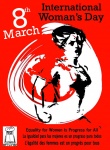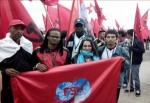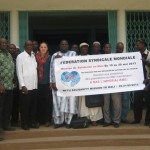 Implementing the resolution of the successful 2nd Panafrican WFTU Affiliates meeting held in Sudan on February 2013, a delegation of WFTU was send to the suffering Mali to express the solidarity of the WFTU affiliates and friends to the Malian people.
Implementing the resolution of the successful 2nd Panafrican WFTU Affiliates meeting held in Sudan on February 2013, a delegation of WFTU was send to the suffering Mali to express the solidarity of the WFTU affiliates and friends to the Malian people.
Mali is a country of more than 14.5 million people. 3rd biggest producer of gold in Africa. Where more than half of the population survives with below $ 1,25 per day. 80% are involved in agriculture while cotton is the main product. Mali has been in continuous instability and suffering following the autonomist extremist movement of jihadist groups in Northern Mali, the coup d’etat of March 2013 and the French-led imperialist intervention which was supported by many forces as well as African countries. The French government has announced that it will sustain a force of 1,000 soldiers indefinitely adding to the 5,000 soldiers it has in its 4 bases in Africa while a “Donors Conference” is taking place in Brussels to decide upon the future of the country.
The mandate of the delegation was to examine the living and working conditions of the people of Mali, to hold bilateral discussions with the trade union movement and to publicize its findings in order to strengthen the international solidarity and support to the struggles of the Malian people.
The delegation formed by cde Abdou Isaaka, representative of the Franco-phone African affiliates and member of the Youth Secretariat of the WFTU from Niger as well as cde Alexandra Liberi, representative from the Central Offices of the WFTU were warmly welcomed in Bamako, Mali on the 19-21st May 2013.During its mission, the WFTU delegation they visited the Headquarters of the Malian Confederation UNTM, which were attacked during the coup in March 2012, were they had a two-hour fruitful discussion with the General Secretary, cde Siaka Diakite and the Deputy General Secretary Tibou Telly, General Secretary of Education Union.
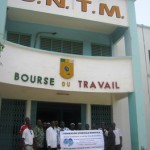 A full briefing was given by UNTM leadership about the conditions of the workers, about the reasons that lead to the conflict and the French-led intervention as well as the problems of the displaced populations today. The discussion also surrounded the forthcoming election which have been announced for July 28th
A full briefing was given by UNTM leadership about the conditions of the workers, about the reasons that lead to the conflict and the French-led intervention as well as the problems of the displaced populations today. The discussion also surrounded the forthcoming election which have been announced for July 28th
The geostrategic developments from the war to Afghanistan, in Libya until the conflict in Mali were widely discussed as well as the profile cultivated by the French as “liberators of Mali” which hides behind the interests for the control of the region and its resources that the imperialist powers have.
The General Secretary of UNTM informed the delegation about the initiatives of the Organisation to denounce the strings attached to the “donors” funding for the “reconstruction of Mali”. Positions which are in agreement with the analysis of the WFTU for the interests of the imperialist forces in the region and their motives for the imperialist interventions.
The UNTM leadership requested from the WFTU to strengthen its solidarity towards the Malian People and welcomed the WFTU Solidarity Mission as necessary and important.
During their program, the WFTU delegation visited the state Textile Industry and met with the local trade union as were as the administration of the enterprise, the Institute of Rural Economy were they discussed about the agricultural development and the action of the WFTU against the high food prices, as well as other Institutions.
A meeting was held with the WFTU Affiliates in Mali were discussions were held about the way forward in trade union coordination in the French-Speaking Africa Region and Africa in general as well as the priorities of the struggles for the workers problems in Mali.
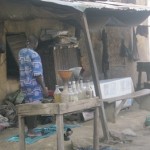 Cde Ibrahima Toure, General Secretary of SYNAPRO and 2nd Deputy General Secretary of UNTM, one of the biggest affiliates of UNTM and member of the WFTU welcomed the delegation and accepted the solidarity messages addressed by many WFTU affiliates in support with the Solidarity Mission.
Cde Ibrahima Toure, General Secretary of SYNAPRO and 2nd Deputy General Secretary of UNTM, one of the biggest affiliates of UNTM and member of the WFTU welcomed the delegation and accepted the solidarity messages addressed by many WFTU affiliates in support with the Solidarity Mission.
Alexandra Liberi, Head of the WFTU Media and Communications Department noted: “the people of Mali have suffered long from lack of education, since only 15% are enrolled in schools, from diseases that could have extinct, due to the multinationals role in the control of the medicines, from food insufficiency, from a low rate of life-expectancy which is about 53 years of life, from lack of access to water, even from existing slavery n some regions of Mali. It is also characteristic that only half of the population has some access to electricity. All this misery was dramatically increased since the Malian people have been caught in the middle of the regional and international imperialist plots and outcomes. On top of that, those who created the problem in the first place are presented as “liberators” and will be given as a gift the whole country, its resources and the future of the Malian people under their full control continuing their colonial grab” and she added: “We cannot forget that it was the imperialists who created the extremist groups against the popular movement in Afghanistan, it was the imperialists who had common goals with the extremist groups in Libya aiming at the control of the oil resources and it was their imperialist intervention in Libya that pushed these groups towards the Northern Mali. A new fragmentation of the region would not be a surprise”.
Cde Abdou Isaaka stated that: “our delegation has expressed our solidarity to the people and the workers of Mali, has heard the problems and the analysis of the situation and has also tried to transfer the international and historical experience to prepare and strengthen the trade unions with the battles they have ahead. We have seen that in all occasion the imperialists they don’t do favors. They have interests and they want to protect only their interests. The “reconstruction of Mali” as it is planned though the “Donors Conference” in Brussels will unfortunately not solve the problems of the Malian people. We see it more like a modern day slave-market. As WFTU we will stand in solidarity with the people of Mali as it is our internationalist duty. The African people must become truly strong and independent and capable to control their present and future and provide complete solutions to their suffering” and he concluded: “the positions of WFTU reflect the reality and the interests of the African people. WFTU’s voice is the voice of the 90% of the African people”.
THE PRESS ROOM


